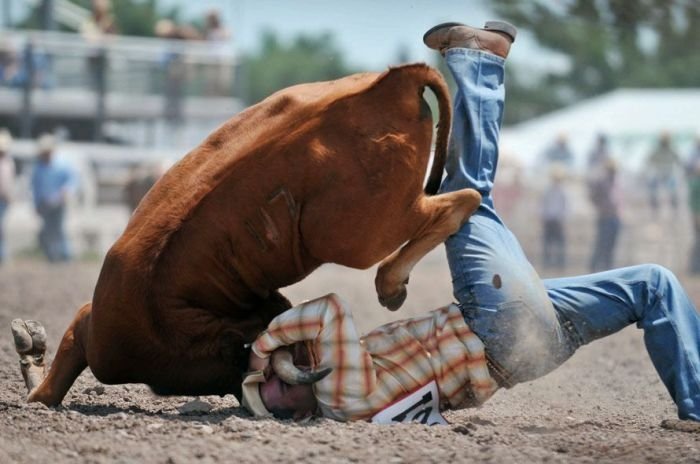|
|
Most Dangerous Moments Of Rodeo
|
Over the years, conditions for animals in rodeo and many other sporting events improved. Today, the PRCA and other rodeo sanctioning organizations have stringent regulations to ensure rodeo animals' welfare. For example, these rules require, among other things, provisions for injured animals, a veterinarian's presence at all rodeos (a similar requirement exists for other equine events), padded flank straps, horn protection for steers, and spurs with dulled, free-spinning rowels. Rodeo competitors in general value and provide excellent care to the animals with which they work. Animals must also be protected with fleece-lined flank straps for bucking stock and horn wraps for roping steers.
Laws governing rodeo vary widely. In the American west, some states incorporate the regulations of the PRCA into their statutes as a standard by which to evaluate if animal cruelty has occurred. On the other hand, some events and practices are restricted or banned in other states, including California, Rhode Island, and Ohio.St. Petersburg, Florida is the only locality in the United States with a complete ban on rodeo. Canadian Humane Societies are careful in criticizing Canadian rodeo as the event as become so indigenous to Western Canada that criticism may jeopardize support for the organization's other humane goals. The Calgary Humane Society itself is wary of criticizing the famous Calgary Stampede. Internationally, Rodeo itself is banned in the United Kingdom and the Netherlands. with other European nations placing restrictions on certain practices.
However, a number of humane and animal rights organizations have policy statements that oppose many rodeo practices, and often the events themselves. Some also claim that regulations vary from vague to ineffective, and are frequently violated.
In response to these concerns, a number of cities and states, mostly in the eastern half of the United States, have passed ordinances and laws governing rodeo. Pittsburgh, for example, specifically prohibits electric prods or shocking devices, flank or bucking straps, wire tie-downs, and sharpened or fixed spurs or rowels. Pittsburgh also requires humane officers be provided access to any and all areas where animals may go—specifically pens, chutes, and injury pens. The state of Rhode Island has banned tie-down roping and certain other practices.Other locales have similar ordinances and laws.
|
|









